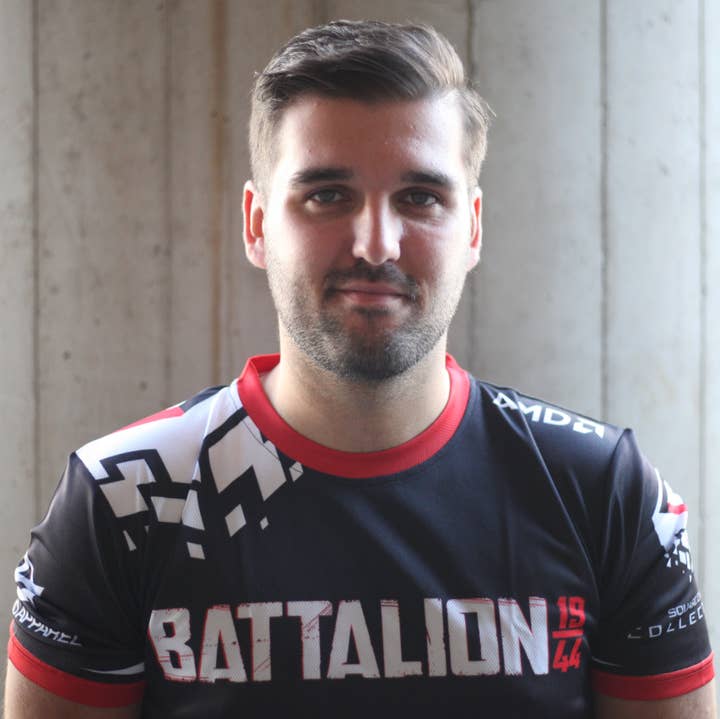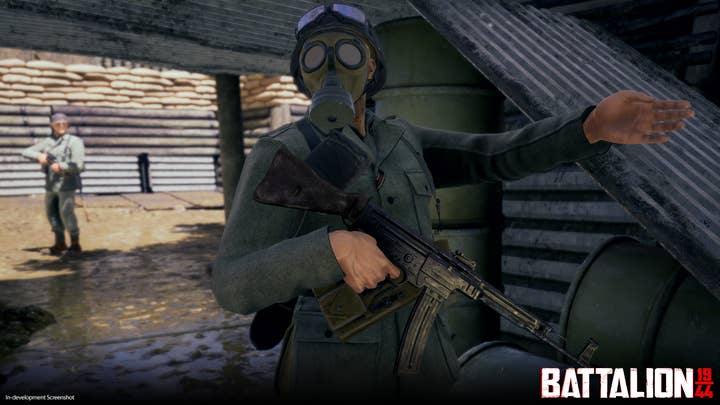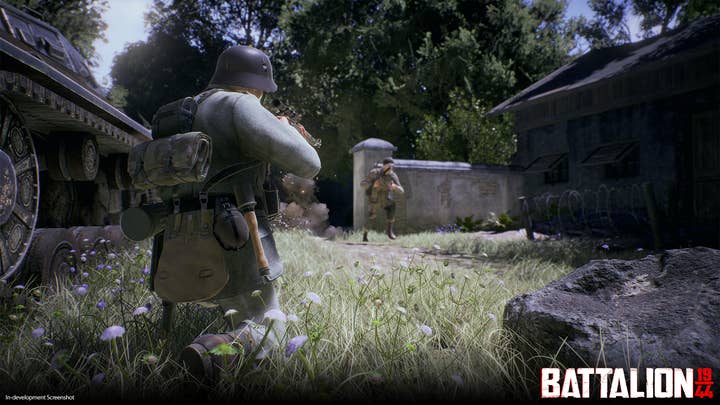"We want Battalion 1944 to change the shooter genre - even if it fails and dies"
Bulkhead Interactive's Joe Brammer on how an indie-developed FPS can stand toe-to-toe with Call of Duty
There is no question that Call of Duty is the king of the military shooter genre.
Despite attempts from EA to revamp Medal of Honor and bulk up Battlefield, and despite seemingly waning interest in Activision's shooters as they became increasingly sci-fi, each annual outing is guaranteed to be among the best-selling games of the year.
According to SuperData's 2017 review, COD: WW2 was only beaten by the perennial success that is Grand Theft Auto in terms of console revenues - and yet combined with ongoing sales of Black Ops III and Infinite Warfare, the franchise generated close to $1bn last year.
So it's hard to see how an independent studio from Derby, England with only 13 employees (according to LinkedIn) can have an impact on Activision's market-leading series.
Nonetheless, that is the goal of Bulkhead Interactive, the developer behind new Early Access multiplayer FPS Battalion 1944. Crafted as both a love letter to the historical military shooters of the past and an alternative for fans tiring of Activision's yearly output, the game aims to take the shooter genre forward... by going backward. No, bear with us here.

The Bulkhead team, according to executive producer Joe Brammer, is "actually obsessed with FPS games" but finds the big budget, AAA games of today to be lacking the kind of charm and fun that got them into the genre in the first place. When sitting down to design Battalion 1944, the goal was to build a competent World War II shooter that incudes "all the good bits" they miss from the early Call of Duty and Medal of Honor titles.
"I don't like that in modern shooters - even Rainbow Six, which I really like - everything is 'press to do an action', like press space-bar to climb through a window," Brammer tells GamesIndustry.biz. "That right there takes control away from the player and gives it to the game - the game is playing for you. You should be controlling it.
"Yeah, it looks a little bit janky when someone is crouch-jumping through a window, but the guy in first-person feels great and the guy shooting the guy crouch-jumping through the window has already forgotten it looks a bit weird. When it feels good to play, that's all that matters."
He goes on to argue that AAA games are often one of two extremes - either tainted by inexplicable bugs that ruin the experience, or too polished to the point of being almost soulless.
"In modern shooters, everything is 'press to do an action'. That right there takes control away from the player"
"Look at Ghost Recon Wildlands - it's overly polished," Brammer says. "A lot of the fun stuff you see on Twitch, a lot of the stuff that's entertaining are things that just happen. Look at PlayerUnknown's Battlegrounds - you don't cap the fun in your game, because you don't really know how much fun your game can be. Don't set rules.
"That's what AAA games feel like to me: they're capping the amount of fun you can have. They are saying, 'this is how you have fun' - and that's not what we want to do. We want to let people go nuts. I think that's the future of at least the next five years of games."
Brammer hopes Battalion 1944 will be the start of that future, but he stresses that the project is not just about remaking 20 year-old games. Nostalgia is a curious filter through which we view the titles of the past, and revisiting certain releases reveals that improvements are still very much needed. There's no sense forsaking the advances of the past ten years if you hope to make something that resonates with today's audience.

"It's about whether you're doing something new," Brammer says. "We want to do something that meets fans [of those old games] halfway.
"Our original question was: what's Call of Duty missing? It might just be matchmaking, a good working server system, team support and back-end support. But obviously we couldn't just go, 'let's take Call of Duty 2, mod it until it works and then release it' - that's not going to be commercially viable for a business. So we had to remake the bits we wanted and then add our own things."
"AAA games feel like they're capping the amount of fun you can have. They are saying, 'this is how you have fun' - and that's not what we want to do. We want to let people go nuts."
It was also crucial to bear the ongoing success of Call of Duty in mind. It was impossible for the Bulkhead team to build something that matched Activision's shooters in every aspect, so careful planning was needed to target Call of Duty's weaknesses and strive to overcome them.
"From day one, we drew a whiteboard of where Call of Duty can beat us - things like console, arcade shooter - and where we can win. And that was stuff like competitive, skill-based, community-driven... the Call of Duty community doesn't drive [the series], Activision can just do what it wants. We also looked at modding, and how we can apply that.
"There are areas where we can win, but it's not about beating them. At the end of the day we want more shooters, more variety [in the genre]. There are some great ones out there - Squad, Rising Storm, Day of Infamy - but a lot of players don't look past the AAA marketing stranglehold."
Brammer also reveals the team is taking leaves directly out of the Call of Duty book, not only studying the original games, but also last year's Call of Duty 4: Modern Warfare remaster and even the latest release.
"We looked closely at the remaster," he recalls. "The way they do things like muzzle flash on the weapons is genius. Players would never know it's a thing, but if it wasn't there they would notice something is wrong.
"There are areas where we can win, but it's not about beating them. At the end of the day we want more shooters, more variety [in the genre]"
"Instead of a crazy beautiful muzzle flash, it's just a big white image that shows up for half a second. What that means is that at range, you instantly know where you're being shot from. You just see the flash and you look there. That's something they've developed over time. They didn't really have that in the old Call of Duty games; they had muzzle flashes but they didn't work for a game design purpose. When you look at Remastered, when you really watch what they do - we recorded it and went through frame-by-frame - you realise some cool things they do.
"Call of Duty WW2 is one of the better console shooters for a while. The connection between the gameplay, the weapon firing and the sound is incredible. It feels like you're really shooting that gun with this tiny PlayStation controller. They've managed to create that symbiosis between everything. That's something we'd like to nail."

And, despite the controversy last year, the independent studio is following an increasingly common AAA business model with the addition of loot crates. However, Brammer stresses that all money generated from this "very basic" system will "go straight back into the game", whether that's funding further development, DLC or even arranging tournaments and events to grow the game's community.
You might think that releasing in the wake of Call of Duty: WW2 - the series' most successful outing in years - is ill-advised for another World War II shooter, or that even the announcement last year would have given Bulkhead pause for thought. But according to Brammer, Activision's latest best-seller poses little to no threat to his game.
"I'd like to see if we can change the shooter industry - even if Battalion fails and dies. I'd like to show there's demand out there for something that's more calm, less steroid-injected."
"We knew Call of Duty: World War 2 was coming out before we started working on Battalion, when we were doing the early prototypes for the Kickstarter back in November 2015," he explains. "We also already knew about Battlefield 1. We weren't just going to sink our business into this one Kickstarter - we did our research, reached out to all the connections we had, gathered little bits of information and realised, 'oh, right, we know what they're doing'. We just had to announce before them, and we had to make sure we had our own game.
"The only similarity between us and the new Call of Duty is it's World War II. And frankly, theirs looks amazing, it looks better. Visually, they're incredible artists. But when it comes down to what really matters - the game part of it - we're just two different things. It's like when people compare NFL and NBA just because they're both sports games.
He continues: "Do you honestly think 100 per cent of Call of Duty players are happy with what they're playing? I don't. Players are looking for something else, because right now there are not a lot of shooters out there. That's our goal: to give another option to the everyman competitive player that wants to come home after work and - while they're not going to practice to become a professional gamer - they love competing in games."
Battalion 1944 is available now in Early Access and Bulkhead's priority is to attract enough shooter fans to justify its continued development. Brammer is even hoping to entice more than just Call of Duty and Battlefield fans, predicting that the game could even win over up to five per cent of Counter-Strike players.
"Call of Duty WW2 is one of the better console shooters for a while. The connection between the gameplay, the weapon firing and the sound is incredible. That's something we'd like to nail."
"That might not be a lot to Activision, but for us that funds an independent studio for years. We can grow our game and community, then go to the next game which hopefully grows again. Before you know it, we could be competing on the top level with the big guys."
Once again, he stresses that this is not the start of a journey that will see Battalion dethrone Call of Duty. Instead, it's an effort to shake up the arguably stagnant FPS market, dominated as it is by two increasingly similar AAA franchises. As Brammer previously said, he wants to see more shooters, more variety - and maybe even get Activision and EA to reconsider their own design ethos.
"I'd like to see what we're doing with Battalion make Call of Duty and Battlefield look at what they're doing and realise that maybe they can pull back a little bit, do things a little bit differently," he says. "I would really like to see if we can change the shooter industry - even if Battalion fails and dies. I'd like to say we showed there's demand out there for something that's a little bit more calm, a little less steroid-injected.
"I definitely see more shooters coming out in the next five years, but I don't see them being made by AAA studios because I don't think they know what they need to be making. Whilst Call of Duty and Battlefield do what they do very well, they're getting closer and closer together [and more predictable]. I assume EA are making Bad Company next.
"I'm interested to see where it goes. I'm kind of tired of people pushing esports when they don't know esports, trying to cash in on things. Twitch is changing things, but I'm interested to see how Twitch actually affects shooters because they're difficult to watch when you can't keep up with every player. But overall I'm pretty excited about the genre."
